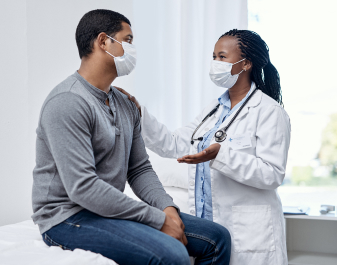
Prostate cancer
Cancer is a disease in which cells in the body grow out of control. When cancer starts in the prostate gland, it is called prostate cancer. Prostate cancer is the second most common cancer among men in the United States.

Prostate cancer risk factors
The exact cause of prostate cancer is unknown, but there are things that can increase a man’s risk of developing it:
- Getting older (Prostate cancer is rare in men younger than 50 years of age.)
- History of prostate cancer in your family (father, brother.)
- A diet high in dairy foods and calcium may cause a small increase in the risk of prostate cancer.

Prostate cancer symptoms
Contact your health care provider if you have any of these symptoms:
- a need to urinate often, especially at night
- sudden urge to urinate
- trouble starting urination
- weak or interrupted flow of urine
- trouble emptying the bladder completely
- pain or burning when urinating
- blood in urine or semen
- pain in the lower back, hips or upper thighs that doesn’t go away
- shortness of breath, feeling very tired, fast heartbeat, dizziness, or pale skin caused by anemia
Any of these symptoms may be caused by cancer or by other, less serious health problems, such as benign prostatic hyperplasia (BPH), which is an enlargement of the prostate. If you have any of these symptoms, it is important that you see a doctor right away.

Prostate cancer routine screening
Early prostate cancer often does not have symptoms. For that reason, it is important for men to have regular checkups so that their doctors can detect it early when it is more easily treated. During your checkup, your health care provider may do a digital rectal exam. Your health care provider inserts a gloved finger with lubricant on it into the rectum and feels the prostate through the rectal wall to check for hard or lumpy areas.

Prostate cancer prevention
You can help prevent prostate cancer by:
- Getting regular checkups with your health care provider.
- Learning if you have a history of prostate cancer in your family.
- Living a healthy lifestyle by:
- Eating well-balanced meals that include plenty of fruits, vegetables and whole grains
- Getting regular exercise
- Maintaining a healthy weight
- Avoiding or limiting limit alcohol
- Quitting tobacco use.
Talk with your health care provider if you have any questions or concerns.
Want to know more?
Learn how Allina Health cares for prostate cancer patients.
Explore our cancer resources
We created this collection of information and support to help you through this time.